CIIF in 2010 Joint World Conference on 10-14 June 2010
Showcase Hong Kong's Diversified Social Capital Development Approach to the World
"2010 Joint World Conference on Social Work and Social Development:
The Agenda" was the first international conference jointly held by three international and eight local organisers in Hong Kong.
At the invitation of the organisers, the CIIF co-organised a workshop and a field visit to show friends from all over the world the diversified models, outcomes and influence of social capital development in Hong Kong. The Joint World Conference was held at the Hong Kong Convention and Exhibition Centre on 10 to 14 June 2010, which was attended by more than 2500 local and overseas social workers practitioners, scholars and policy makers.
Co-organising the Workshop on "Social Capital: A Foundation for Building Community Capacity"
Five CIIF Projects showing five features of local social capital development
To highlight the outcomes of enhanced community capacity through social capital development, the CIIF and the Conference co-organised the Workshop on "Social Capital: A Foundation for Building Community Capacity" on 11 June 2010, and the project teams of five CIIF-funded Projects were invited to share their valuable and practical experience.
Some 100 participants from all over the world attended the Workshop which was very well-received. Mr YEUNG Ka-sing, Chairman of the CIIF Committee who welcomed and briefed on the basic concepts of the CIIF, the promotion of social capital in Hong Kong and the initial outcomes achieved. Then came Professor Joe LEUNG, Chairman of the CIIF Assessment and Evaluation Sub-Committee who conducted the Workshop. He briefed on the key strategies of promoting social capital in Hong Kong, and shared his experience and the outcomes of five Projects implemented in the form of case study.
1.
Case 1 : Mobilising Community Network ---
Connecting Low-income Families
Ms Lilian LAW, Executive Director of the Boys' and Girls' Clubs Association of Hong Kong and Dr TING Wai-fong, Associate Head of the Department of Applied Social Sciences of the Hong Kong Polytechnic University used the practical example of the Sham Shui Po Child-Family Community Network Project and shared their experience in building a community network in Sham Shui Po. This project, based on the growth needs of children, encouraged commercial partners to be their pen-pals, with a view to broadening their horizons and enhancing their learning and development potentials. In parallel, parent volunteer groups were organised for a children-friendly community environment.

Some 100 participants from all over the world attended the Workshop which was very well-received.

Mr YEUNG Ka-sing
Professor Joe LEUNG

Ms Lilian LAW, Executive Director of the Boys' and Girls' Clubs Association of Hong Kong and Dr TING Wai-fong, Associate Head of the Department of Applied Social Sciences of the Hong Kong Polytechnic University
2.
Case 2 : Modern Apprenticeship –
Enhancing Youth Employability and Development
The Hon Mrs Sophie LEUNG, and Mr David PUN, Founder and Chairman of ROADS respectively, elaborated on how to effectively mobilise the commercial sector to join, for example, the Career Park Project so that highly effective training courses could be designed for social capital development. This project specially recruited some youths who failed to adapt to the mainstream education system. Through activities-based training courses, matching between mentors and mentees as well as alumni club networks, it successfully assisted youngsters to build support networks, become self-confident, enhance their employability and explore their potential of starting up business. Upon completion of the courses, trainees were given chances for practical training in private companies where course trainers and "mentors" would provide them with support and buttress.

The Hon Mrs Sophie LEUNG, and Mr David PUN, Founder and Chairman of ROADS
3.
Case 3 : Medical-Welfare-Community Collaboration ---
Providing the Community and the Elderly with Full Support
Ms Adela LAI, Cluster General Manager (Nursing and Community Health), Kowloon West Cluster of the Hospital Authority introduced the case of Cheung Ching Safe and Healthy Estate Project. This project established a community heath centre managed by social workers through the integration of nursing and social work professions. The nursing staff taught voluntary residents and the elderly basic knowledge and skills of health care, who then paid regular visits to needy families and discharged patients together. With better self-care, the elderly could be engaged in the community with networks established around the clients by promoting health and care to engage the neighbourhoods. Meanwhile, the casualty ward attendances and hospital admissions of the elderly were effectively decreased, with many sides benefited.

Ms Adela LAI, Cluster General Manager (Nursing and Community Health), Kowloon West Cluster of the Hospital Authority
4.
Case 4 : Exploring Star House Captains ---
Weaving Resident-based Mutual Help Network
The "Caring Estates" in Southern District Project, a successful example of social capital development, was launched by the Aberdeen Kaifong Welfare Association Social Service Centre (AKWASSC) for public housing estates in Southern District, Hong Kong Island. Ms Emily KWONG, Director of the AKWASSC elaborated on the three phases of community networking development, namely confirmation, connection and expansion. Under the House/Floor Captain approach first launched by the Project, "House/Floor Captains" were mobilised to care for and help their neighbours on their respective floors, which could effectively establish neighbouring networks. Star House Captain Mr Steven CHAN shared his personal experience in promoting good neighbourhood which focused on exploring, utilising and leveraging neighbours' merits so as to foster their mutual trust and community participation.

Ms Emily KWONG, Director of the AKWASSC
Star House Captain, Mr Steven CHAN
5.
Case 5 : Setting up Cross-sectoral Steering Committee ---
Building Harmonious, Safe and Healthy City
"To Cultivate a Safe and Healthy City in Tung Chung" Project launched by the Working Committee of Tung Chung Safe and Healthy City, which was a community organisation jointly set up by local residents and cross-sectoral stakeholders, was a good example of cross-sectoral commitment to community development. Principal LEUNG Siu-tong of HKFEW Wong Cho Bau Secondary School, Chairman of the Working Committee, happily shared his experience that 24 organisations had sent their representatives to the Working or Steering Committee. The Project succeeded in drawing together local fronts and resources as well as enhancing residents' participation in building up Tung Chung as a harmonious, safe and healthy city.

Photo of Professor Joe LEUNG and sharing guests

Display boards for the CIIF and the five Projects were erected in the venue for reference

Principal LEUNG Siu-tong of HKFEW Wong Cho Bau Secondary School, Chairman of the Working Committee
Visiting Projects
CIIF Project Teams' Full Contact with Foreign Participants
Immediately after the Workshop, more than 10 friends from the US, Holland, the UK, Japan, India and Thailand took part in two visiting projects, namely the CIIF-funded Splendid Fashion Project and "Network K.C." -- Mutual Help and Community Networking Project, arranged by the CIIF in the afternoon of 12 June 2010.

"Network K.C." -- Mutual Help and Community Networking Project

The CIIF-funded Splendid Fashion Project
The first spot was the Splendid Fashion Workshop at San Po Kong. This project, launched by the Lok Kwan Social Service, demonstrated the new cross-sectoral collaboration model which involved business enterprises, a design school and the Garment Fashion Practitioners Association. This visit showed unique local brand fashion products jointly produced by a magic match between experienced middle-aged clothes makers and young fashion designers. Through the reciprocal mentoring relationship, the empowering process leveraging on the advantage of professional workmanship combined with creative design did explore new space for the survival of the clothing industry that was considered declining in Hong Kong.

Splendid Fashion Workshop at San Po Kong

Unique local brand fashion products
The Project Team arranged project participants, including tailors, female clothes makers and young fashion designers to brief on the backgrounds of the Project and the Workshop and share their views and experience in co-operation between mentors and mentees. Visitors were very interested in the background and operation of the Workshop, in particular how the advantages of mutual help, trust and partnership among members could help this declining industry survive and even compete with its mechanised mass production counterparts in the Mainland. In response, the Project Team indicated that competitiveness came from their unique design, high quality, stringent control and monitoring processes as well as the brand name of "Made in Hong Kong". What they were most concerned was the satisfaction they drew from bringing their interests and talents into play rather than financial rewards. Lastly, visitors were presented cloth bags designed and handmade by participating women as souvenirs!
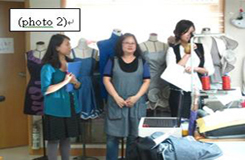
Tailors (photo 3 right), Female clothes makers (photo 2 middle, photo 3 left)
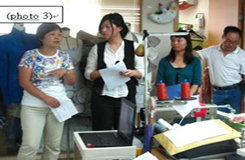
Tailors (photo 3 right), Female clothes makers (photo 2 middle, photo 3 left)
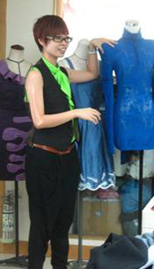
Young fashion designers
Afterwards, visitors came to visit "Network K.C." Project at Tung Wah Group of Hospitals Wong Cho Tong Social Service Building in Ho Man Tin. This project aimed to promote the development of mutual help networks and inclusive spirit among residents in the Kowloon City District. The inclusive interface was an energetic acrobatic performance by a cross-generational acrobat troupe composed of elder, middle-aged and young persons. Through co-operation, practice and public performance, the troupe members were empowered and integrated, and a mutual help and interactive network which enhanced their community commitment and fostered intergenerational solidarity was effectively woven.

The inclusive interface was an energetic acrobatic performance by a cross-generational acrobat troupe composed of elder, middle-aged and young persons.

Visit “Network K.C.” Project at Tung Wah Group of Hospitals Wong Cho Tong Social Service Building in Ho Man Tin
The acrobatic troupe comprised members aged 5 to 90 above. The Project Team specially arranged members of three generations, namely elders, women and secondary students , to share their experience in their positive changes in personal mindsets, making friends with people of different ages in the course of participation as well as enhancing self-confidence and interpersonal skills. Then the troupe presented a live acrobatic performance carrying the message of social capital, and they also taught visitors acrobatic skills. It was really an enjoyable show!
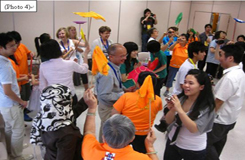
They taught visitors acrobatic skills
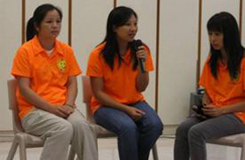
Secondary School Students Members

Elders Members
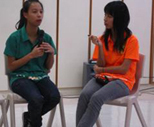
Women Members
